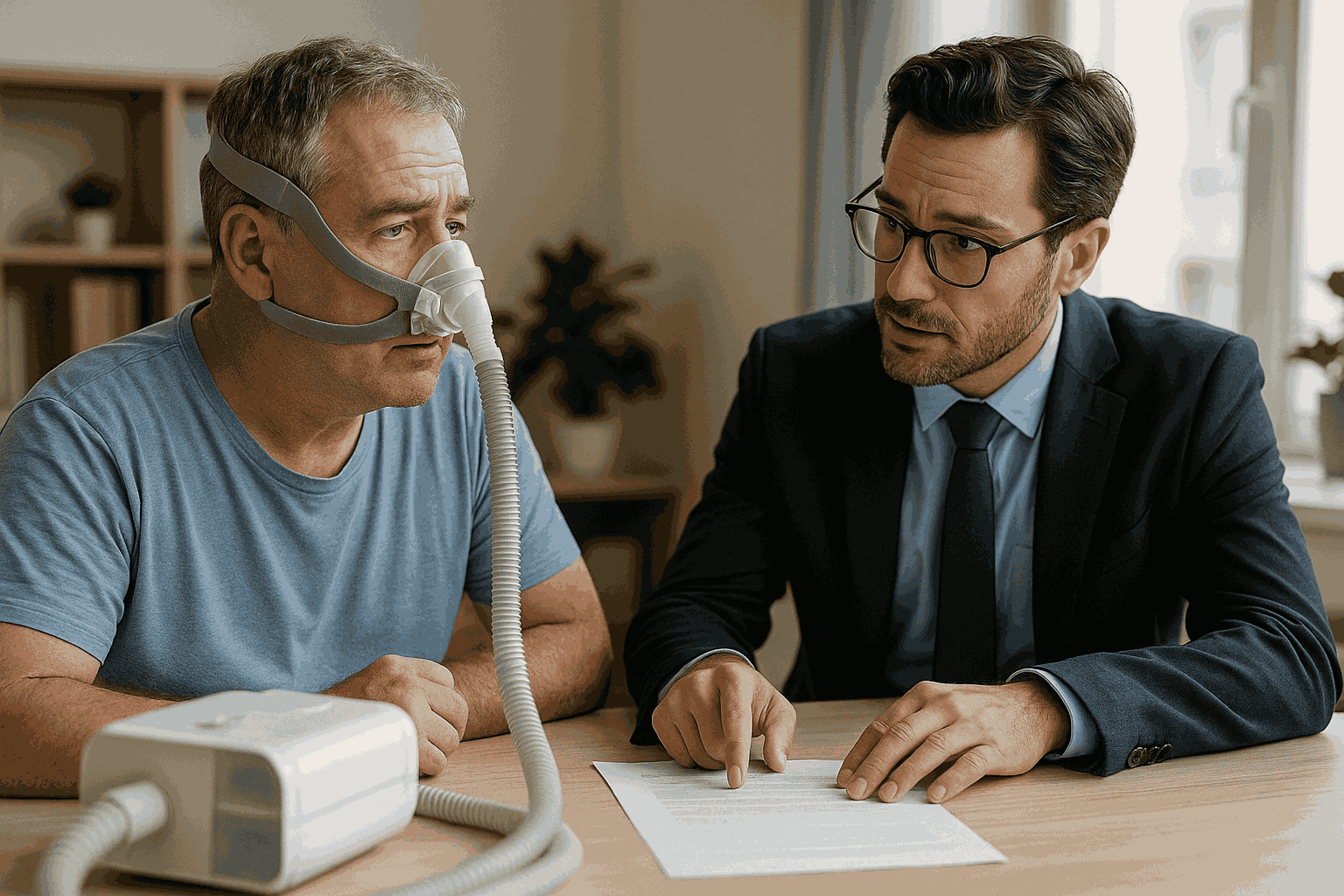
In 2021, millions of people who relied on Philips CPAP and BiPAP machines for sleep apnea treatment received alarming news. The devices they used nightly to breathe better might actually be putting them at serious risk of lung damage, cancer, and toxic exposure.
Now, thousands of affected users are taking legal action in what has become one of the largest medical device mass tortsin recent years. If you or a loved one used a recalled Philips machine and suffered health complications, here’s what you need to know about the growing Philips CPAP machine recall lawsuits.
What Happened with the Philips CPAP Recall?
In June 2021, Philips Respironics issued a massive recall of over 15 million devices, including:
- CPAP (Continuous Positive Airway Pressure) machines
- BiPAP (Bi-Level Positive Airway Pressure) machines
- Mechanical ventilators
The recall was due to PE-PUR foam degradation. This foam was used inside the machines to reduce noise, but under heat and humidity, it could break down and release:
- Toxic particles
- Cancer-causing chemicals (VOCs – volatile organic compounds)
Users could inhale or swallow these toxins, night after night, without knowing the danger.
Which Philips Devices Were Affected?
Recalled models include popular machines such as:
- DreamStation (1st generation)
- SystemOne
- REMstar SE Auto
- Trilogy ventilators
- A-Series BiPAP devices
Both home-use and clinical-use devices were affected. Philips later admitted it had received complaints about black particles in breathing tubes even before the recall but did not act immediately.
What Health Risks Are Being Reported?
Victims involved in lawsuits have reported a wide range of serious health conditions, believed to be linked to long-term use of the recalled machines:
- Lung irritation or inflammation
- Chronic respiratory issues
- Persistent cough or airway infections
- Asthma and bronchitis exacerbation
- Lung cancer
- Throat, nasal, or esophageal cancer
- Kidney or liver damage
- Headaches and dizziness
- Toxic or chemical poisoning symptoms
The longer someone used the device, the higher the risk. In some cases, users were told to stop using the device but were not given a safe replacement for months.
Why Are Victims Filing Lawsuits?
People who used recalled Philips devices are filing lawsuits because they say:
- Philips knew or should have known about the risks
- The company waited too long to alert the public
- Replacements and repairs were slow and inconsistent
- Victims suffered real harm while following their doctor’s treatment plans
These lawsuits accuse Philips of negligence, product liability, and failure to warn, among other claims.
Some plaintiffs are family members of patients who have died and are filing wrongful death lawsuits.
Who Qualifies to File a Philips CPAP Lawsuit?
You may be eligible to file a claim if:
- You used a recalled Philips CPAP, BiPAP, or ventilator machine
- You used the device for six months or longer
- You have been diagnosed with a respiratory condition, cancer, or organ damage after use
- You have medical records linking your condition to long-term exposure
- A loved one used the machine and died due to related complications
Even if you are unsure of a connection, it’s worth speaking with a legal expert. Many injuries take time to show up, and early filing helps preserve your legal rights.
What Compensation Can Victims Receive?
Lawsuits are seeking compensation for:
- Medical expenses and treatments
- Long-term care or surgeries
- Missed work or lost income
- Pain and suffering
- Emotional distress
- Funeral expenses (in wrongful death cases)
- Punitive damages (to punish corporate negligence)
Settlements are still being negotiated, but attorneys expect some victims may receive six- or seven-figure payouts, especially those with cancer or life-altering lung disease.
What Is the Current Status of the Lawsuits in 2025?
As of 2025, more than 700 lawsuits have been consolidated into multi-district litigation (MDL) in Pennsylvania federal court. This process groups similar claims to speed up pre-trial discovery and allow for bellwether trials.
Bellwether trials are test cases. If Philips loses one or more of them, it could lead to a global settlement offer for remaining plaintiffs.
Philips has also begun negotiating limited reimbursement programs, but many believe these fall short of what victims truly deserve.
What About Class Action vs. Mass Tort?
There are two types of claims being filed:
- Class action suits focus on economic damages, like the cost of replacing the machine
- Mass tort suits focus on personal injuries—these are the cases where victims are seeking higher compensation for medical harm
If you suffered health problems, the mass tort route is usually more appropriate, as it allows for personalized payouts based on your unique injuries.
What Should You Do If You Used a Recalled Device?
Here’s a simple step-by-step guide:
- Stop using the device if your doctor agrees. Don’t quit cold turkey—always consult a medical professional first.
- Check your device model number on the official Philips recall site to confirm if it was affected.
- See a doctor for a full checkup and document any respiratory issues or unusual symptoms.
- Save the device if possible. It may be important evidence.
- Talk to a mass tort lawyer who handles CPAP-related claims. They’ll review your situation and guide you on what to do next.
- Don’t sign or accept offers directly from Philips without legal review. Some early programs offer very limited compensation.
Final Thoughts
The Philips CPAP machine recall lawsuits are more than a legal fight—they are a demand for accountability from a company that failed to protect patients. If you’ve been affected, you deserve answers, support, and possibly compensation.
Don’t wait too long. Statutes of limitations vary by state, and your opportunity to file may be limited in time. A simple call to a legal expert could help you understand your rights and whether you have a case.